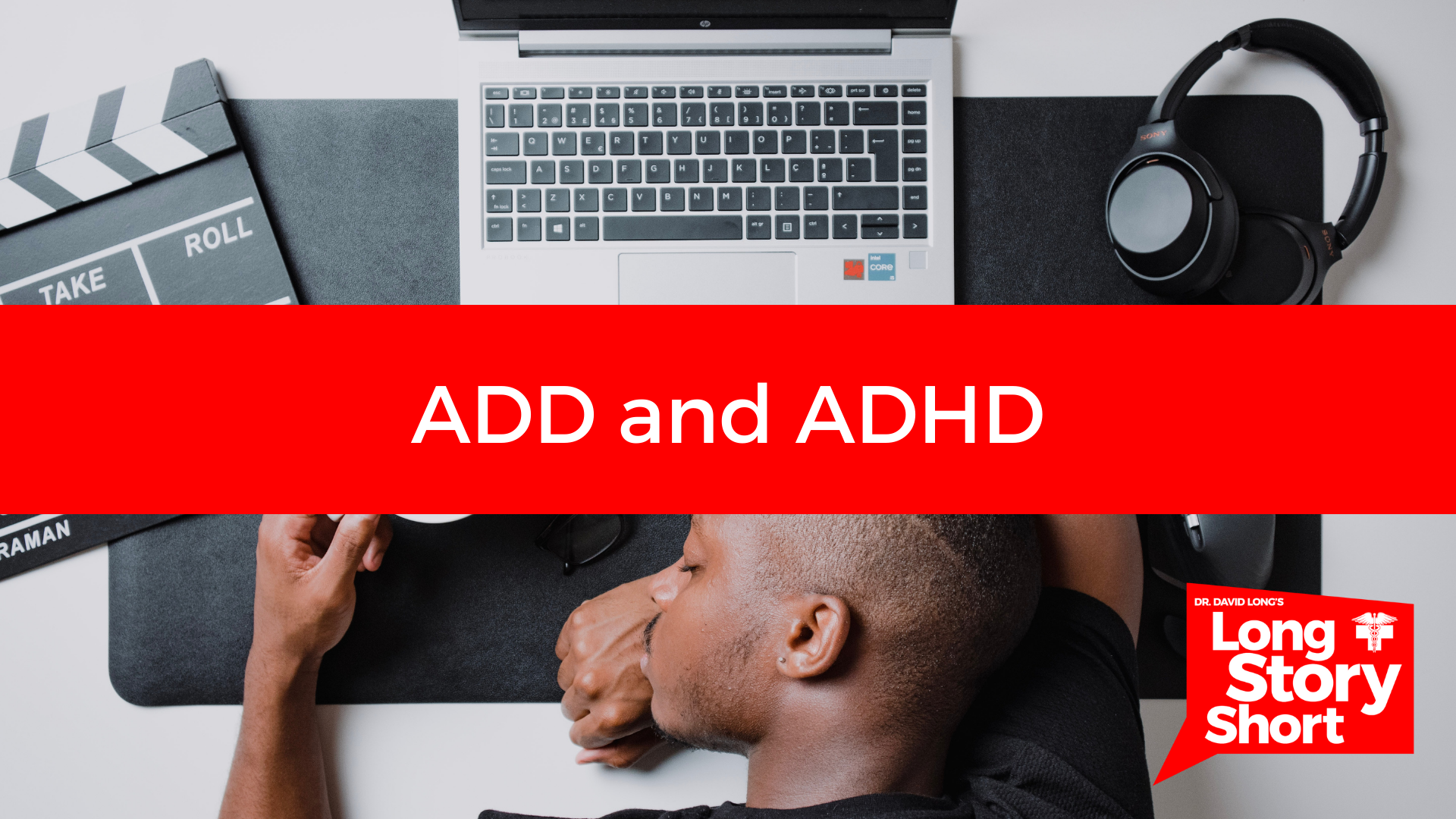ADD and ADHD Summary
•ADD and ADHD are the most common mental disorders diagnosed in the United States.
• Symptoms of ADHD include inattention, difficulty concentrating, and difficulty staying organized and completing tasks.
• Causes of ADHD are unknown, but there is some hereditary association with it.
• Counseling can be helpful for treating symptoms of ADHD. Medications can also be effective in treating symptoms by providing input that scratches the itch that a developing brain is craving.
Full Text
ADHD: attention deficit, hyperactivity disorder. What a terrible name. There’s no deficit of attention. There’s way too much attention, to too many things. I’m Dr. David Long. I’m going to take a few minutes today to talk to you about ADD and ADHD.
We all know somebody who either has, or has a child who’s been diagnosed with ADD or ADHD. It is the most common mental disorder diagnosed in the United States. Saying it’s a mental disorder is difficult for me because I wonder if a lot of these children, not all, only have these symptoms that stand out because we put them in an environment where they have to sit for long periods of time and stay attentive to subjects which may or may not hold their interest. I think much of the time there is nothing wrong with these children, but in the context of having them with their wonderful, vibrant, colorful personalities, have to sit quietly and sit still and listen, they’re unable to do it. And we have to remember that this setting of having these children sit quietly and still for eight hours at a time is a relatively new concept. Hundreds of years ago, certainly thousands of years ago, there wasn’t likely a scene that required that of our kids. So we have sort of a square peg in a round hole.
I have this wonderful child, nothing wrong with them, but they are not functional in this particular academic environment. And so for that child, I am an absolute advocate of treating their ADHD, whether that means behavioral strategies and counseling, or it means medications, or whatever it takes to help that child succeed in school.
What are the symptoms of ADHD? Well, inattention, difficulty concentrating, difficulty staying organized and completing tasks often associated with hyperactivity or impulsivity. What are the causes? Well, we don’t really know. We know that there is some hereditary, association with it. We think that there are some things that predispose one to ADHD that happened in utero before the child’s even born.
While those are some of the causes, here are some of the things that we know are not causes. Sugar does not cause add or ADHD. Sorry parents, but neither does television. So let’s discuss the treatment. Counseling can be very helpful. We need to counsel a child to find out, is there an anxiety disorder? Is there depression that is manifesting itself as these ADHD symptoms? Because if we can ever treat an underlying cause rather than just treating the symptoms, we really have a whole lot more to gain.
Another really effective treatment is medications. I’m telling you what, if you match the right medication with the right child, you can change their life and no, it is not to make mom’s life easier. It’s not to make the teacher’s life easier. It is to help that child realize the potential they have because after years of struggling and struggling and struggling, and then becoming more uncomfortable in that classroom setting, these kids begin to just wear this with this lack of confidence. They think they’re stupid. They think that they just have no control over their impulsivity. Something’s wrong with them. Then we give them this medication that can help them assimilate into this environment where they need to be. And the light goes off. They realize what they’re capable of. They get a confidence about them, and it can change their life.
So, so many times I hear the well-intentioned, but under-informed, usually a dad who says [these are my people so I get to make fun of them], “My kid ain’t got no ADD. He can sit in front of that television for hours without even looking away from it. What he needs is some discipline. What he needs is some self control.” Well, like I said to begin with ADD- attention deficit disorder is a terrible name. There is no deficit of attention. It’s attention to everything. And what is demanding requiring that child’s attention – light color, motion, and sound. What is a video game? Light color, motion, and sound! That video game is providing what that child’s brain is craving. Whereas listening to the Texas history teacher is not providing that child’s brain what it thinks it needs that constant neural input. And so every sound is a distraction. Every color flash is a distraction. Every thought about something is a distraction and that child developmentally appropriately, that child does not have it within them to go.
I’m distracted. I need to redirect, Oh, I got distracted again. I need to redirect. And what the medication does is it provides that input. It scratches the itch that wonderfully fascinating developing brain that is craving input, gets the input from the medication and all of that distraction drowns out. And they’re able to attend to, they’re able to pay attention to what’s right in front of them. And it is unbelievably effective.
One of the peculiar things that we see about ADD is that this is a rarity in regards to disorders, where an adult will commonly require less medication, a lower dose than a child. Why is that? What, as I mentioned before, the child may not have it within them to redirect, to refocus, to remind themselves, to pay attention. Presumably the adult can do that. If the adult is maturing, as we hope they are, they are getting more self control and they can redirect, and we don’t want to overmedicate anybody. So we meet that patient right where they are.
For the teenager, to what degree can this person redirect themselves to be attentive? If they do that well, they don’t need as much medication. If they are completely unable to do that, they’re going to need more medication. So sometimes I’ll see a patient that comes to me, maybe an adult, and they’re on the maximum dose of an ADD medication, you know, because they’re big, they’re a big adult. And the first thing we do is start coming down because if I’m over-medicating that person, then they never do have to meet it halfway. They never do have to develop their behavioral strategies to help themselves cope with their attention deficit disorder. And then after a while, the medications become a little bit less effective if we’re using high doses over and over, and we’ve done nothing to prepare that person for life after medication, for getting to the point where they don’t need it anymore. We’ve dosed, overdosed them so much that it becomes a crutch. And I really, really advocate for adults in particular, being on the lowest possible effective dose.
One final thought about ADD. As a family medicine physician truth is I don’t find it very difficult to treat attention deficit disorder. It’s not that hard to treat, but the diagnosis is pretty tricky. The diagnosis requires that you have symptoms in more than one environment. It’s not just work or school or at home. And we have to be sure that there’s nothing else causing the symptoms, whether it’s a thyroid disorder or anxiety or depression or some other psychiatric concern, we have to eliminate all of those before we can justify using amphetamines or other stimulant medications to treat true ADD.
So while I don’t mind a patient coming to me for treatment, I recommend that they get a thorough assessment from a behavioral health specialist, preferably a psychologist who I find, do really, really, deep and investigative interactions with their patient assessments to be sure that that’s what we have- ADD and not anxiety or depression or something else. Then they send the patient to me and I get the easy part, treating them is easy. I hope you found some of this helpful, useful information.





 and then
and then